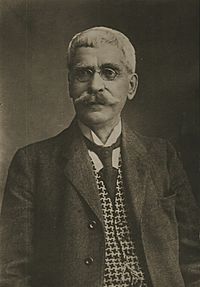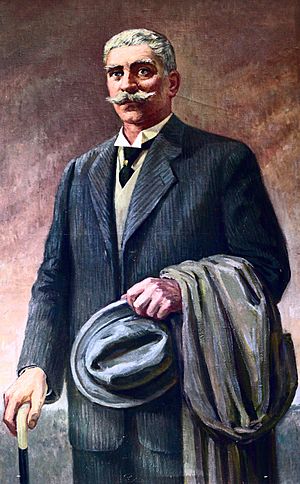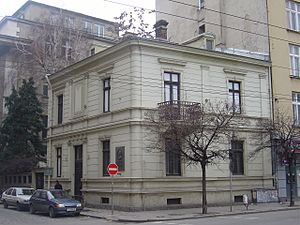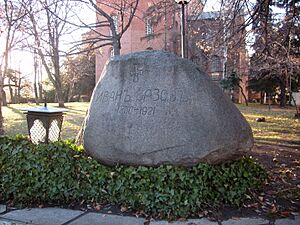Ivan Vazov facts for kids
Quick facts for kids
Ivan Vazov
|
|
|---|---|

Portrait of Vazov
|
|
| Born | June 27, 1850 OS Sopot, Bulgaria (then Ottoman Empire) |
| Died | September 22, 1921 (aged 71) Sofia, Bulgaria |
| Occupation | poet, novelist, playwright |
| Notable works | Under the Yoke Epic of the Forgotten Songs of Macedonia |
Ivan Minchov Vazov (born June 27, 1850 – died September 22, 1921) was a famous Bulgarian writer. He was a poet, novelist, and playwright. Many people call him the "Patriarch of Bulgarian literature." This means he is seen as the most important writer in Bulgaria's history.
Ivan Vazov was born in Sopot. This town is in the Rose Valley of Bulgaria. At that time, Bulgaria was part of the Ottoman Empire. His writings tell stories from two important times in Bulgarian history. These are the Bulgarian Renaissance and the time after Bulgaria became free from Ottoman rule. Vazov also held the highest honor from the Bulgarian Academy of Sciences. He was an Academician. From 1897 to 1899, he even served as the Minister of Education. His parents, Saba and Mincho Vazov, greatly influenced him.
Contents
Early Life and Education
Ivan Vazov finished primary school in Sopot. His father, Mincho, then sent him to Kalofer. There, Ivan worked as an assistant teacher. After his exams, he returned to Sopot to help in his father's grocery store. The next year, his father sent him to Plovdiv. He attended a school run by Naiden Gerov. It was in Plovdiv that Vazov began writing poetry.
He later went to Oltenița in Romania. His father wanted him to learn about trade from his uncle. But Ivan was not interested in business. He loved literature instead. Soon, he left his uncle's place. He went to Brăila, where he met Bulgarian revolutionaries. One of them was Hristo Botev, a famous Bulgarian revolutionary and poet.
Joining the Fight for Freedom
In 1874, Ivan Vazov joined the fight for Bulgaria's freedom. He wanted his country to be independent from the Ottoman Empire. He returned to Sopot in 1875. There, he became part of the local revolutionary group. After the April Uprising failed in 1876, he had to leave Bulgaria. He went back to Galaţi, where many revolutionaries were living. He became a secretary for their committee there.
In 1876, Vazov published his first work, Priaporetz and Gusla. This was followed by "Bulgaria's Sorrows" in 1877. Bulgaria gained its independence in 1878. This happened after the Russo-Turkish War. After this, Vazov wrote the famous Epic of the Forgotten. He also became an editor for political magazines. These were called Science and Dawn.
However, he was forced to leave Bulgaria again. He went to Odessa because of political problems. With his mother's help, he returned to Bulgaria. He started working as a teacher. Later, Vazov moved to Svishtov, where he became a civil servant.
Famous Works and Later Life
In 1889, Ivan Vazov moved to Sofia. There, he started publishing a magazine called Dennitsa.
His most famous novel is Under the Yoke, written in 1888. This book describes how Bulgarians lived under Ottoman rule. It is a classic of Bulgarian literature. The book has been translated into more than 30 languages.
Later in his life, Vazov was a very important person in Bulgaria. He was respected in the country's social and cultural life. He passed away on September 22, 1921.
Some of Vazov's other well-known works include:
- Novels: New Country (1894), Under Our Heaven (1900), The Empress of Kazalar (1902), Songs of Macedonia (1914), It Will Not Perish (1920).
- Plays: Vagabonds (1894), A Newspaperman? (1900), Borislav (1909), and Ivaylo (1911).
Vazov's Legacy
Ivan Vazov's home in Sofia is now a museum. You can see how he lived there. The museum has his furniture and even his preserved dog. It is located at the corner of Ivan Vazov Street and Georgi S. Rakovski Street in Sofia.
Honors and Memorials
Many places are named after Ivan Vazov to honor him.
- The Ivan Vazov National Theatre in Sofia is named after him.
- The "Ivan Vazov" neighborhood in Sofia is also named for him.
- The Ivan Vazov National Library in Plovdiv carries his name.
- A park near St. Sofia Church in Sofia has a monument to Vazov.
- Vazovova Street in Bratislava, Slovakia, is named after him.
- Vazov Point and Vazov Rock on Livingston Island in Antarctica are also named in his honor.
In 1917, Ivan Vazov was nominated for the Nobel Prize in literature.
Images for kids
See also
 In Spanish: Ivan Vazov para niños
In Spanish: Ivan Vazov para niños
 | William M. Jackson |
 | Juan E. Gilbert |
 | Neil deGrasse Tyson |






